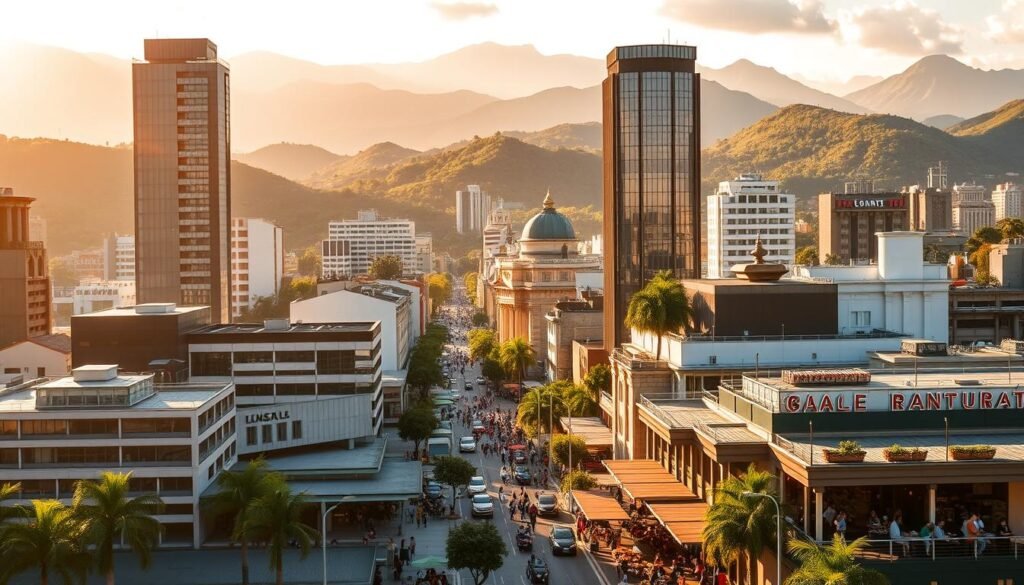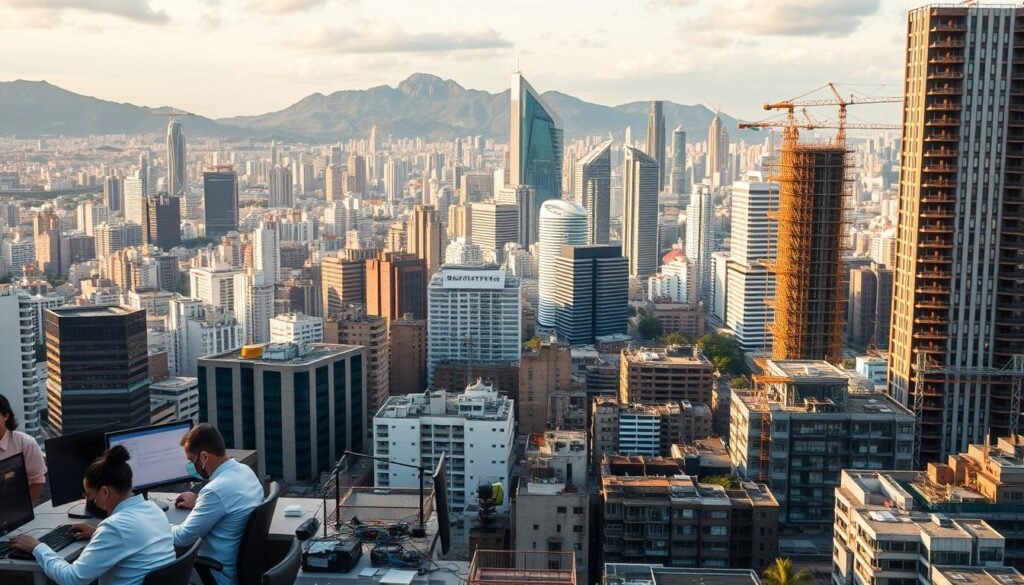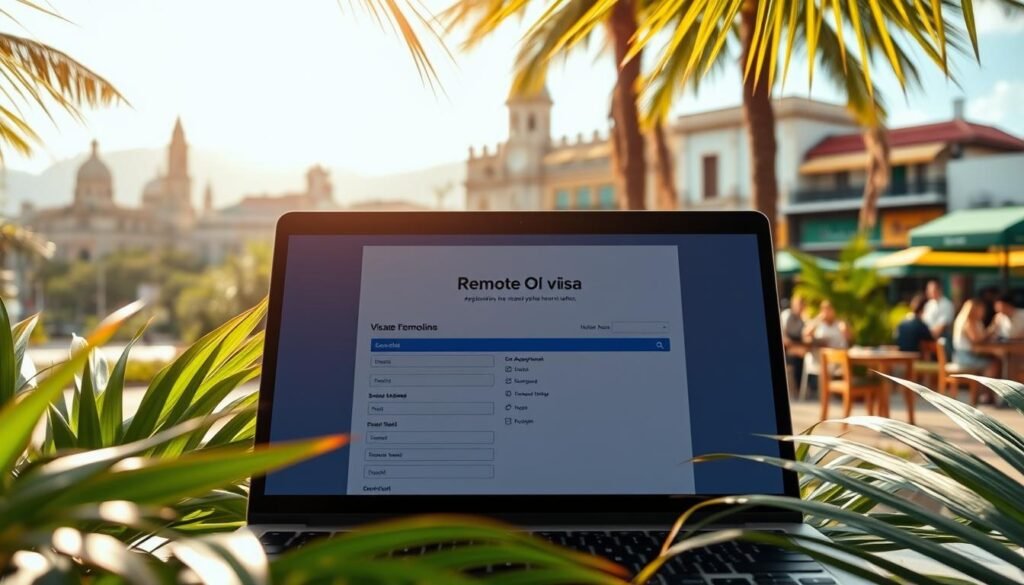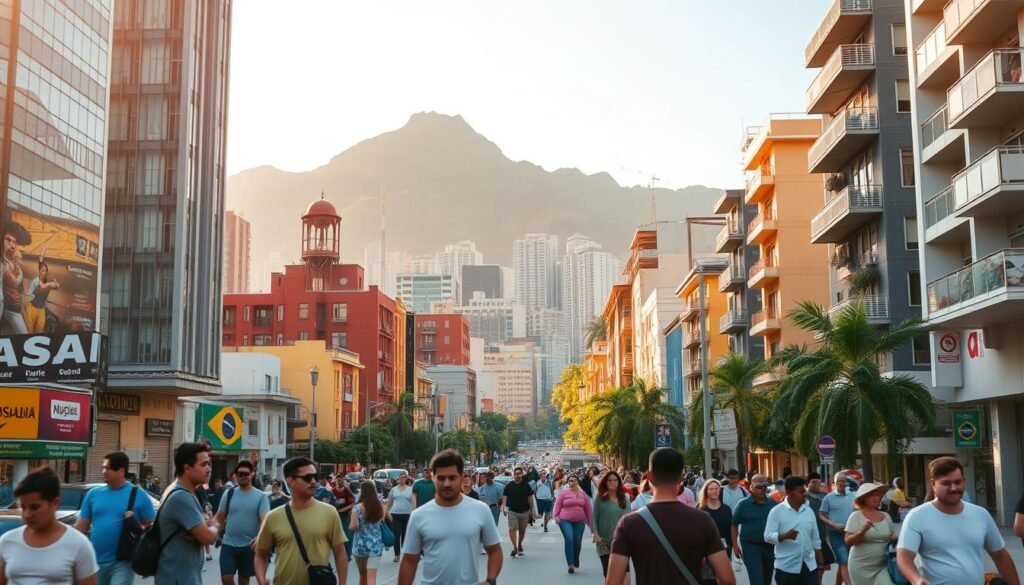Brazil stands as Latin America’s largest economy and ranks seventh globally. With vast coastlines, dense rainforests, and thriving industries, it offers diverse employment options. Key sectors like agriculture, tech, and energy drive its growth.
The country welcomes professionals through traditional roles and remote work arrangements. A digital nomad visa simplifies relocation for freelancers and remote employees. However, local hiring laws require companies to prioritize Brazilian talent.
Whether you seek a corporate job or location independence, understanding visas, language, and culture is essential. This guide covers everything from booming industries to tax rules for expats.
Key Takeaways
- Brazil is Latin America’s top economy with strong agriculture and tech sectors.
- Remote workers can apply for a digital nomad visa with income proof.
- Companies must hire at least two-thirds local employees.
- Portuguese fluency boosts opportunities in most fields.
- Tax residency starts after 183 days in the country.
Why Consider Working in Brazil?
From tech hubs to eco-tourism, Brazil blends opportunities with adventure. As a G20 member, its economy thrives on agriculture, energy, and innovation. You’ll find a vibrant mix of urban careers and outdoor lifestyles.
Brazil’s Growing Economy and Opportunities
Ranked seventh globally, Brazil leads South America in growth. Key sectors include:
- Banking: The Real currency stabilizes financial jobs.
- Hydroelectric power: Supplies 60% of the nation’s energy.
- Tech: São Paulo’s startups rival Silicon Valley.
| City | Industry | Advantage |
|---|---|---|
| São Paulo | Finance/Tech | High salaries, global firms |
| Rio de Janeiro | Tourism | Networking, flexible roles |
Cultural Richness and Lifestyle Perks
Beyond careers, Brazil offers UNESCO World Heritage Sites and Carnaval’s energy. Enjoy:
- 30 days of annual leave + 12 holidays.
- Coastal cities with 66% lower costs than New York.
- Amazon ecotourism for weekend escapes.
Portuguese fluency (spoken by 97% of the population) unlocks deeper connections.
Understanding Brazil’s Job Market

Foreign talent finds growing demand in Brazil’s thriving industries. While local hiring quotas require companies to fill 66% of roles with Brazilians, specialized fields like engineering and tech face significant shortages. This creates opportunities for skilled professionals worldwide.
Key Industries Hiring Foreign Talent
Civil and mechanical engineering roles have a 15% vacancy rate, driven by infrastructure projects. The tech industry grows 22% yearly, with São Paulo competing for software developers. Healthcare also needs talent, averaging 3.2 doctors per 1,000 people—below OECD standards.
Emerging fields like renewable energy and data science add to the market’s dynamism. Companies recruiting globally often sponsor visas for these high-need roles.
Challenges for International Workers
Portuguese fluency is non-negotiable for 89% of mid-level jobs. Visa processing averages three months, delaying employment starts. Additionally, navigating labor laws like CLT (Consolidation of Labor Laws) requires expert guidance.
Despite hurdles, Brazil’s cultural vibrancy and economic potential make it a compelling country for career growth. Networking and language prep ease the transition.
Working in Brazil: Visa Requirements
Brazil offers multiple work visa options tailored to different professional needs. Whether you’re a tech specialist or a renewable energy expert, understanding the government rules ensures a smooth transition.
Types of Work Visas
The VITEM V is a temporary permit valid for two years, renewable once. After four years of continuous employment, you may qualify for permanent residency. Digital nomads can opt for the VITEM XIV, designed for remote workers.
How to Apply for a Work Visa
Start by gathering documents like your passport, CV, and employment contract. Submit these through the Brazilian consulate in your home country. Approval involves:
- Ministry of Foreign Affairs review
- Federal Police registration within 90 days of arrival
Employer Sponsorship Process
Most visas (83%) require a job offer from a local employer. Your sponsor submits the application to Brazil’s General Coordination of Immigration. Once approved, you’ll need a taxpayer ID within 30 days.
Top Cities for Expats and Digital Nomads

Expats and digital nomads find diverse urban landscapes across Brazil’s top cities. Whether you seek beachside freelancing or corporate careers, these hubs blend opportunity with lifestyle perks.
Rio de Janeiro: Beaches and Business
Rio de Janeiro merges tourism with corporate energy. Home to Petrobras HQ, it offers hybrid work roles in energy and hospitality. The *population* thrives on cultural festivals and coastal networking.
Safety tips for expats:
- Choose neighborhoods like Leblon or Ipanema for lower crime rates.
- Learn basic Portuguese to navigate local companies.
São Paulo: The Economic Powerhouse
São Paulo dominates Brazil’s industry, with tech salaries 37% above the national average. Multinational firms and startups pack its skyline.
Key stats:
- Avg. cost: $1,062/month (co-working spaces included).
- 300 Mbps internet speeds fuel remote work.
Emerging Hubs: Florianópolis and Brasília
Florianópolis, the “Brazilian Silicon Valley,” hosts 200+ startups in clean energy and coding. Brasília lures expats with government contracts and planned infrastructure.
| City | Key Advantage | Avg. Monthly Cost |
|---|---|---|
| Rio de Janeiro | Hybrid economy | $850 |
| São Paulo | Tech salaries | $1,062 |
| Florianópolis | Startup scene | $700 |
| Brasília | Government roles | $780 |
For budget nomads, Natal offers beachfront living at $573/month. Each city caters to different professional goals and lifestyles.
High-Demand Jobs in Brazil

The Brazilian job market is booming with specialized roles across multiple sectors. STEM careers are projected to grow 18% through 2026, while education and healthcare face critical shortages. Whether you’re a tech expert or medical professional, these fields offer stable employment.
Tech and Engineering Roles
São Paulo’s tech industry pays senior developers R$15,000+ monthly. Cloud architects and SAP consultants can earn R$18,000–R$28,000. Emerging roles like AI prompt engineers are gaining traction.
Engineering specializations vary:
- Offshore oil/gas: Petrobras leads with 120+ annual hires
- Renewable energy: Wind turbine projects need mechanical engineers
Healthcare and Education Opportunities
Foreign-trained doctors must pass Brazil’s medical licensing exam. Top earners include:
- Medical directors (R$40,000–R$60,000/month)
- Corporate psychologists for workplace wellness programs
International schools like Graded School São Paulo seek bilingual teachers. Over 9,000 English teaching vacancies exist nationwide. Niche roles like petrochemical translators blend language skills with industry knowledge.
Teaching English in Brazil

Teaching English opens doors to Brazil’s vibrant culture and growing demand for language skills. Private schools, corporations, and hospitals seek qualified instructors, offering competitive salaries and flexible work arrangements. Whether you prefer classroom teaching or one-on-one tutoring, Brazil’s education sector welcomes native speakers with the right credentials.
Qualifications and Certification Requirements
A 120-hour TEFL certificate is the minimum for most jobs, but a CELTA boosts your chances with top companies like Cultura Inglesa. While a bachelor’s degree isn’t mandatory, it helps secure roles in international schools. Portuguese fluency (B1 level) is a plus, especially for professionals teaching specialized courses like *Medical English* at Sírio-Libanês Hospital.
Salary tiers reflect experience and credentials:
- University instructors: R$4,000/month
- Corporate trainers: Up to R$7,000/month
- Freelance tutors: R$150–300/hour in affluent areas
Where to Find Teaching Jobs
Major cities like São Paulo and Rio de Janeiro host the highest employment opportunities. Platforms like ESL Employment and Go Overseas list openings, while local networks help land unadvertised roles. For freelancers, apps like Preply connect tutors with students nationwide.
Top employers include:
- Cultura Inglesa: Brazil’s largest language school chain
- International TEFL Academy: Hires certified graduates
- Corporate programs: Banks and tech firms need business English coaches
Remote Work and Digital Nomad Scene

Brazil has become a hotspot for remote professionals seeking sun, culture, and reliable infrastructure. With its digital nomad visa and thriving coworking spaces, the country offers an ideal blend of productivity and adventure.
Brazil’s Digital Nomad Visa
The VITEM XIV visa lets you stay for one year, renewable for another. You’ll need:
- Proof of $1,500+ monthly income (bank statements or contracts)
- A remote job or freelance clients outside Brazil
- Health insurance valid locally
Unlike tourist visas, this work permit allows legal employment for foreign companies. Stay beyond 183 days, and you’ll need to file taxes on local earnings only.
Best Coworking Spaces and Cafés
From beachside hubs to urban offices, Brazil caters to every work style. Top spots include:
| City | Space | Perks |
|---|---|---|
| São Paulo | WeWork Paulista | 24/7 access, rooftop lounge |
| Rio de Janeiro | Selina Lapa | Poolside desks, cultural events |
| Florianópolis | Habitat Coworking | Surf breaks, fiber-optic WiFi |
For reliable internet, Vivo Fibra averages 300 Mbps in major cities. TIM Live works well for mobile hotspots during beach work sessions.
Nomad communities thrive in Curitiba and Belo Horizonte. Join Meetup groups like “Digital Nomads Brazil” for networking and local tips.
Salary Expectations and Cost of Living

Balancing earnings and expenses is key for a comfortable life abroad. Brazil offers diverse pay scales, with tech professionals earning up to 4x the minimum wage. Smaller cities like Florianópolis cut costs by 30% compared to Rio.
Average Salaries by Profession
Software engineers average R$7,463/month, while teachers earn R$3,210. Income tax starts at 7.5% for salaries above R$1,903/month. UX designers outearn back-end devs by 25% in São Paulo.
| Profession | Monthly Salary (BRL) | Tax Rate |
|---|---|---|
| Software Engineer | 7,463 | 15–22.5% |
| Teacher | 3,210 | 7.5% |
| Finance Manager | 15,000+ | 27.5% |
Comparing Costs: Rio vs. Smaller Cities
Rio’s rent averages $900/month, but Florianópolis drops to $600. Groceries cost 20% less in Fortaleza than São Paulo. Ride-sharing apps save 15% over metro passes in major cities.
- Hidden fees: International transfers incur 15–25% banking charges.
- Healthcare: Private insurance adds $150/month to budgets.
- Transport: Monthly passes cost R$240 in Rio vs. R$180 in Belo Horizonte.
Tax residents (183+ days per year) pay progressive rates up to 27.5%. Plan for Brazil’s 13th salary bonus, mandatory for all employee contracts.
Language Requirements for Working in Brazil

Mastering Portuguese unlocks career growth in Latin America’s economic giant. Over 97% of the *population* speaks it, making fluency non-negotiable for most roles. Even in global companies, local language skills build trust and streamline collaboration.
Why Portuguese is Essential
Brazilian companies require Portuguese for 89% of mid-level jobs. The Celpe-Bras exam tests business proficiency, with scores affecting visa approvals. Key industries like healthcare and engineering demand industry-specific vocabulary.
Without fluency, you’ll face hurdles:
- Job applications rejected if submitted in English.
- Limited networking in local work environments.
- Higher reliance on translators for contracts.
Resources to Learn Portuguese Fast
Apps like Duolingo and BBC Portuguese teach basics in 15-minute daily lessons. For career-focused learning:
| Resource | Focus | Best For |
|---|---|---|
| CIAL Florianópolis | Immersion programs | Rapid fluency |
| Tandem App | Language exchange | Conversational practice |
| Portuguese for Engineers | Technical vocab | STEM professionals |
Pro tip: Pair apps with weekly meetups. Cities like São Paulo host free language exchanges at coworking spaces.
Navigating Social Security and Taxes

Understanding Brazil’s tax system is crucial for expats planning long-term stays. The government requires both employee and employer contributions to social programs. These funds provide retirement, healthcare, and unemployment benefits.
Mandatory Contributions for Expats
As an employee, you’ll contribute 7.5%–14% of your salary to INSS (National Social Security). Employers add 20% to this fund. The FGTS (Severance Fund) requires another 8% from your employer monthly.
Key differences from US systems:
- INSS caps at R$828.38/month regardless of income
- FGTS funds remain accessible during emergencies
- Tax treaties with 33 countries prevent double taxation
| Contribution | Paid By | Rate | Annual Cap |
|---|---|---|---|
| INSS | Employee | 7.5-14% | R$9,940.56 |
| INSS | Employer | 20% | None |
| FGTS | Employer | 8% | None |
Understanding FGTS and INSS Benefits
After one year of contributions, you qualify for INSS benefits. These replace 70%–100% of your salary during:
- Medical leave
- Parental leave
- Retirement after 35 years of payments
FGTS funds grow at 3% interest yearly. You can withdraw them for:
- Home purchases (100% of balance)
- Termination without cause (40% bonus)
- Serious illnesses (full amount)
Required documents include:
- CPF (tax ID number)
- RNE (foreigner registration)
- Employment contract from local companies
Portugal and Chile have special agreements with Brazil. US expats should consult IRS Publication 54 about foreign tax credits.
Brazilian Work Culture and Etiquette

Navigating Brazil’s professional landscape requires cultural fluency beyond language skills. From delayed meetings to hierarchical titles, local norms blend warmth with formality. Mastering these nuances helps you build trust and thrive in offices or client negotiations.
Business Meeting Norms
Brazilian business meetings prioritize relationships over rushed deals. Expect at least three conversations before signing contracts. Titles matter—address colleagues by *Engenheiro* (Engineer) or *Doutor* (PhD) unless invited to use first names.
Dress codes vary:
- Banking/law: Suits signal authority
- Tech startups: Polished casual (think blazers + jeans)
Avoid direct criticism. Brazilians favor *jeitinho*—finding indirect solutions to save face. Gift-giving? Skip purple (mourning) and black. Instead, bring wine or artisanal chocolates for hosts.
Punctuality and Communication Styles
Time is fluid here. Social events start 30+ minutes late, but corporate meetings run closer to schedule. Interruptions during discussions show engagement, not rudeness.
| Scenario | Expectation | Tip |
|---|---|---|
| First meeting | 15 mins grace period | Bring translated business cards |
| Negotiations | Lunch over 2+ hours | Discuss family before deals |
After-work socializing cements bonds. Friday *churrascos* (barbecues) are networking gold. Decline politely if needed—Brazilians respect sincerity over forced attendance.
Job Hunting Tips for Expats

Landing your dream role in Brazil requires smart strategies tailored to local norms. The employment market values cultural fit as much as skills, so adapt your approach to stand out.
Top Job Portals and LinkedIn Strategies
Brazilian companies post roles on Catho, Gupy.io, and Indeed BR. These platforms support English filters, but Portuguese keywords boost visibility. For LinkedIn:
- Headline hacks: Use “Bilingual [Your Role]” or “Open to Work in Brazil.”
- Profile tweaks: Add a professional photo (expected locally) and list marital status (common in CVs).
Headhunters like Michael Page specialize in expat placements. Robert Half focuses on finance and tech roles. Both prefer candidates with translated résumés.
Networking in Brazil’s Expat Communities
Personal connections drive 70% of hires. Join Internations São Paulo for industry mixers or AMCHAM Brazil’s corporate events. Alumni networks (e.g., FGV EAESP) offer insider referrals.
Pro tip: Learn basic Portuguese before networking. Even simple phrases like “Prazer em conhecê-lo” (Nice to meet you) build rapport fast.
| Resource | Focus | Best For |
|---|---|---|
| Internations | Social mixers | Casual connections |
| AMCHAM | Corporate networking | Executives |
Internships and Volunteer Opportunities

Gaining hands-on experience through internships can jumpstart your career in Brazil. Whether you’re a student or a recent graduate, programs like AIESEC and Intern Brazil connect you with top companies. Volunteer roles, from Amazon conservation to urban education, offer cultural immersion while making an impact.
Gaining Experience in Brazilian Companies
The VITEM IV visa lets students intern for up to two years. Paid internships must follow Brazil’s Consolidação das Leis do Trabalho (CLT) wage laws. Unpaid roles are rare outside academic partnerships.
Top hosts include:
- Ambev: Offers marketing and supply chain internships.
- Vale: Mining and engineering roles in Pará.
- Natura: Sustainability-focused projects in São Paulo.
Popular Internship Programs
Petrobras recruits engineering interns annually, with 80% transitioning to full-time employment. AIESEC’s Global Talent program places professionals in startups and NGOs.
| Program | Duration | Benefits |
|---|---|---|
| AIESEC | 6–12 months | Visa support, housing |
| Intern Brazil | 3–6 months | Stipend (R$1,500+) |
For volunteers, the VITEM XI visa allows two years with NGOs. Projects range from Amazon wildlife monitoring to teaching English in favelas. Organizations like Eco Caminhos blend sustainability with community work.
Health Insurance and Benefits for Expats

Brazil’s healthcare system presents unique choices for foreign professionals. You’ll need to decide between the public SUS network and private options. Quality and accessibility vary dramatically between these systems.
Public vs. Private Healthcare
The SUS (Sistema Único de Saúde) provides free care to all legal residents. However, emergency room waits often exceed 4 hours, and English-speaking staff are rare. Many companies require private coverage for employees due to these limitations.
Private hospitals like Albert Einstein offer faster service with multilingual staff. Costs range from $150-$300 monthly for comprehensive plans. Consider these key differences:
- Emergency care: SUS averages 6-hour waits vs. 30 minutes at premium facilities
- Specialists: Private networks provide direct access to 90% more doctors
- Prescriptions: SUS covers basics; private plans include brand-name drugs
Finding the Right Insurance Plan
International brokers like Pacific Prime simplify plan comparisons. Look for these essential features:
| Coverage Type | Recommended For | Average Cost |
|---|---|---|
| Basic Private | Short-term expats | $500/year |
| Comprehensive | Families | $2,000-$5,000/year |
| Global | Frequent travelers | $8,000+/year |
Telemedicine platforms like Docway provide 24/7 access to English-speaking doctors. Dental add-ons (OdontoPlan) cost extra but save 60% on procedures. Remember – pregnancy coverage typically has 180-day waiting periods.
Your company may offer group insurance, but verify if it meets your needs. Many people supplement with international plans for travel coverage. Always check if your preferred hospitals accept the insurance before signing up.
Conclusion
Securing a job in this vibrant country starts with mastering Portuguese and understanding visa rules. From fintech hubs in Belo Horizonte to São Paulo’s corporate scene, opportunities await skilled professionals.
Before relocating, ensure your checklist includes:
- CPF registration for tax purposes
- FGTS account setup for social benefits
- Proof of income for work visa applications
Cultural trust (“confiança”) matters more than rushed deals. Build relationships through networking groups like Brazil Expats on Facebook. Stay updated on trends—remote work policies and digital nomad visas evolve yearly.
With preparation, you’ll thrive in Latin America’s largest economy. Ready to begin? Start polishing your résumé and connecting with local recruiters today.
